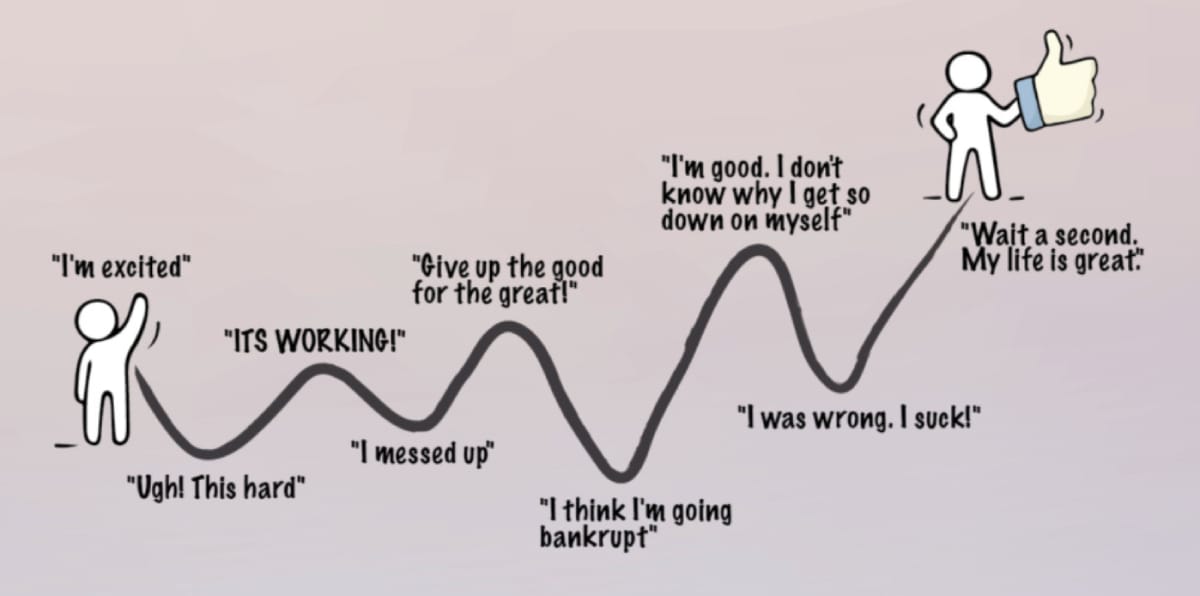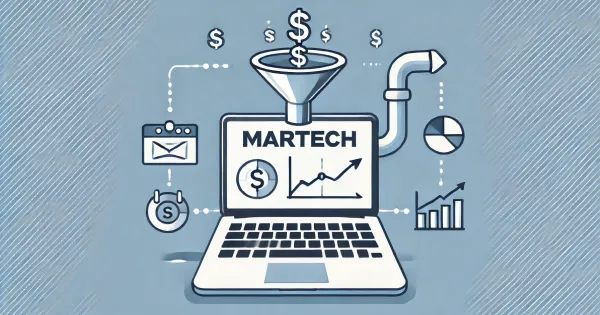5 Limiting Beliefs Holding Back Entrepreneurs

Entrepreneurship is one marked by excitement, innovation, and discovery. However, it is also a path laden with challenges, uncertainties, and fears. While external obstacles are often visible and tangible, it's the internal barriers that can be the most formidable foes. Among these, limiting beliefs stand out as silent saboteurs of potential, quietly undermining the aspirations of even the most determined entrepreneurs.
Limiting beliefs are deeply held convictions that constrain our life in some way, shaping our actions, decisions, and perceptions. In entrepreneurship, these beliefs can be particularly insidious, holding individuals back from realizing their full potential. Whether it's the fear of failure, the sting of impostor syndrome, the paralysis of perfectionism, the shadow of success, or the isolation of the "lone wolf" mentality, these beliefs weave a complex web that entraps the entrepreneurial spirit.
Addressing and overcoming these limiting beliefs is not just beneficial; it's essential for personal growth and business success. By identifying and challenging these mental barriers, entrepreneurs can unlock new levels of achievement, innovation, and fulfillment. The following sections dive into five common limiting beliefs, offering insights and strategies to break free from their hold and pave the way for a thriving entrepreneurial journey.
Limiting Belief #1: Fear of Failure

The fear of failure looms large in the entrepreneurial world, acting as one of the most pervasive barriers to innovation and success. This fear extends beyond simple apprehension over financial loss or business setbacks; it taps into deeper anxieties about inadequacy, public embarrassment, and the judgment of peers. For many entrepreneurs, this fear can manifest in various debilitating ways, including chronic procrastination, over-analysis, and an aversion to taking the calculated risks necessary for growth.
"Success is not final, failure is not fatal: it is the courage to continue that counts." -Winston Churchill
At its core, the fear of failure misrepresents the nature of entrepreneurship—a journey defined by experimentation, risk, and, inevitably, occasional setbacks. Recognizing failure as an integral and instructive part of this journey is crucial for moving beyond this fear. It allows entrepreneurs to reframe setbacks not as indicators of personal inadequacy but as valuable learning experiences that contribute to personal and professional development.
To dismantle the fear of failure, entrepreneurs can adopt several strategies:
- Shift Your Mindset: Embrace a growth mindset, where failure is seen as a step towards mastery rather than a reflection of your worth. This perspective encourages resilience and a proactive approach to learning.
- Set Incremental Goals: Break down larger objectives into smaller, manageable tasks. Celebrating small wins builds confidence and mitigates the impact of setbacks.
- Seek Out Stories of Resilience: Learning about how other entrepreneurs have faced and overcome failure can inspire and provide practical strategies for navigating similar challenges.

By actively addressing and reframing the fear of failure, entrepreneurs can liberate themselves from one of the most significant internal obstacles to their success. This shift not only fosters a healthier relationship with risk and failure but also opens the door to greater innovation, growth, and resilience in the face of the uncertainties inherent in the entrepreneurial journey.
Limiting Belief #2: Impostor Syndrome

Impostor Syndrome is a psychological pattern in which individuals doubt their accomplishments and have a persistent, internalized fear of being exposed as a "fraud," despite evidence of their competence. This phenomenon is surprisingly common among entrepreneurs, who often venture into uncharted territories, innovating and creating paths where none existed before. The novelty and uncertainty of such endeavors can exacerbate feelings of self-doubt and fraudulence.
"It's not what you are that holds you back, it's what you think you are not." - Denis Waitley
The impact of impostor syndrome on entrepreneurs can be profound, leading to unnecessary stress, anxiety, and decision paralysis. It can also prevent them from pursuing opportunities, seeking investment, or celebrating their successes, for fear that these achievements are not truly deserved.
Overcoming impostor syndrome begins with recognizing its presence. Entrepreneurs should actively challenge their self-doubting thoughts and seek to understand their origins. Practical steps include:
- Documenting Successes: Keeping a record of achievements, positive feedback, and milestones can serve as tangible evidence against impostor feelings.
- Seeking Support: Conversations with mentors, peers, or a professional can provide perspective, validation, and strategies to combat these feelings.
- Redefining Failure: Understanding that mistakes and setbacks are part of the growth process, not proof of incompetence or fraudulence.
By confronting impostor syndrome directly, entrepreneurs can reclaim their confidence, recognize their worth, and fully embrace their entrepreneurial journey.
Limiting Belief #3: Perfectionism

Perfectionism, while often seen as a positive trait, can become a crippling limitation for entrepreneurs. The desire to make every detail flawless can lead to endless revisions, delays in product launches, and missed opportunities. In a fast-paced entrepreneurial environment, the pursuit of perfection can become the enemy of progress.
"The greatest opportunity you have for growth lies within your allowance of mistakes."
Perfectionism stems from a fear of criticism or failure, driving entrepreneurs to set impossibly high standards for themselves and their ventures. However, this relentless pursuit can hinder growth, as it prevents the valuable learning that comes from testing, failing, and iterating.
To combat perfectionism, entrepreneurs can:
- Embrace the MVP (Minimum Viable Product) Approach: Focus on launching MVP products that meet the core needs of your target audience, then iterate based on feedback.
- Set Realistic Goals: Understand that no endeavor is without flaw, and aim for excellence rather than perfection.
- Practice Self-Compassion: Recognize that you are human and that making mistakes is a part of learning and growth.
By acknowledging the limitations of perfectionism and striving for progress, not perfection, entrepreneurs can foster a more productive, innovative, and forgiving approach to business.
Limiting Belief #4: Fear of Success

At first glance, the fear of success might seem paradoxical. Why would anyone fear achieving their goals? Yet, for many entrepreneurs, the prospect of success brings its own set of anxieties and uncertainties. This fear often stems from concerns about the increased responsibilities, expectations, and changes that success might bring. Entrepreneurs might worry about losing their privacy, facing heightened scrutiny, or not being able to sustain their achievements.
"Everything you want is on the other side of fear" - Jake Canfield
The fear of success can manifest as self-sabotage: avoiding opportunities, scaling efforts down, or not following through on projects. To overcome this limiting belief, entrepreneurs need to:
- Identify and Address Underlying Fears: Reflect on what aspects of success are daunting and why. Is it the fear of change, increased pressure, or potential isolation?
- Set Manageable Goals: Break down the journey into smaller, achievable steps, making success feel more manageable and less overwhelming.
- Seek Support: Engage with mentors, coaches, or peer groups who can offer guidance, reassurance, and strategies for managing success.
Embracing success requires a mindset shift, recognizing that the challenges it brings are also opportunities for growth and learning. By preparing mentally and practically for these changes, entrepreneurs can welcome success with confidence and resilience.
Limiting Belief #5: The Lone Wolf Myth

The myth of the lone wolf entrepreneur — the idea that to be truly successful, one must go it alone, relying solely on one's grit and determination — is a deeply entrenched belief in the entrepreneurial world. However, this mindset overlooks the immense value of collaboration, mentorship, and community in business success. Believing that seeking help is a sign of weakness can lead entrepreneurs to unnecessary isolation, burnout, and missed opportunities for growth and learning.
“Wolves don’t hunt singly, but always in pairs. The lone wolf was a myth.” - John Fowles
The reality is that no one achieves success in isolation. Behind most successful entrepreneurs is a network of supporters, advisors, and collaborators. Overcoming the lone wolf myth involves:
- Embracing Community: Seek out entrepreneurial communities, networking groups, or online forums where you can share experiences, challenges, and successes.
- Seeking Mentorship: Finding mentors who have navigated the entrepreneurial path can provide invaluable insights, guidance, and encouragement.
- Valuing Collaboration: Partner with other businesses or entrepreneurs. Collaboration can lead to innovative solutions, shared resources, and mutual growth.
Breaking away from the lone wolf mentality allows entrepreneurs to leverage the collective wisdom, experiences, and strength of a community, enriching their entrepreneurial journey and paving the way for more sustainable success.
Final Thoughts
Entrepreneurship is fraught with challenges, both external and internal. Among the most formidable are the limiting beliefs that entrepreneurs hold about themselves and their journeys. Fear of failure, impostor syndrome, perfectionism, fear of success, and the lone wolf myth are not just obstacles but opportunities for growth. By confronting and overcoming these beliefs, entrepreneurs can unlock new levels of personal and professional development.
The path to overcoming these limiting beliefs involves self-reflection, a willingness to seek help, and the courage to embrace vulnerability. Remember, the goal is not to eliminate fear or doubt entirely, but to learn how to move forward in spite of them. Entrepreneurs are, by their very nature, pioneers venturing into the unknown. By acknowledging and addressing the internal barriers that hold them back, they can navigate their journey with greater confidence, resilience, and openness to the endless possibilities that lie ahead.
In the end, the true measure of success is not just in the businesses built, or the profits earned, but in the personal growth experienced along the way. Entrepreneurs who recognize and overcome their limiting beliefs are well on their way to a fulfilling and successful entrepreneurial life, defined on their own terms.
Key Takeaways
| Limiting Belief | Key Takeaways |
|---|---|
| 1. Fear of Failure | - Embrace a growth mindset. - Break goals into manageable tasks. - Prepare for setbacks with a contingency plan. - Seek inspiration from stories of resilience. |
| 2. Impostor Syndrome | - Document achievements for self-validation. - Seek support from mentors and peers. - Understand and challenge the origins of self-doubt. |
| 3. Perfectionism | - Adopt the MVP (Minimum Viable Product) approach. - Aim for excellence, not perfection. - Practice self-compassion and acknowledge human limitations. |
| 4. Fear of Success | - Reflect on specific fears associated with success. - Define personal success beyond external metrics. - Acclimate to success through gradual exposure. |
| 5. The Lone Wolf Myth | - Engage with entrepreneurial communities. - Seek mentorship and collaboration. - Recognize the value of support networks in achieving success. |
Top Books on Limiting Beliefs
- "Higher Is Waiting" by Tyler Perry - This book shares Tyler Perry's journey of overcoming adversity and self-limiting beliefs, emphasizing persistence and self-worth.
- "The Big Leap" by Gay Hendricks - Hendricks explores the concept of the "upper limit problem" that holds people back from achieving their full potential, offering insights into overcoming these mental barriers.
- "The 5-Second Rule" by Mel Robbins - Robbins introduces a simple yet effective tool to break the cycle of procrastination and self-doubt, encouraging action over hesitation.
- "Limitless: How to Identify Your Fears, Challenge Your Self-limiting Beliefs, and Fulfill Your Potential" by Meghan Sanstad - Through personal stories and insights, Sanstad guides readers on identifying and overcoming fears and self-limiting beliefs.
- "Atomic Habits" by James Clear - Although not exclusively about limiting beliefs, this book offers practical strategies for forming good habits and breaking bad ones, which can help in overcoming self-imposed barriers to success.







